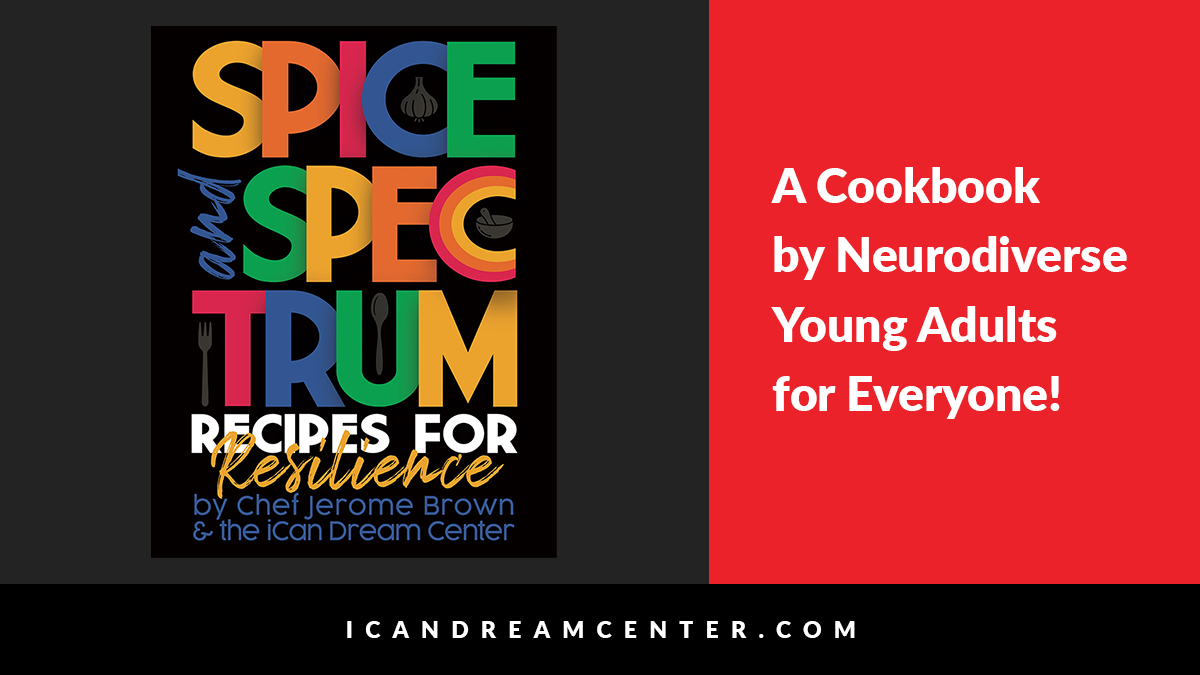
A Cookbook by Neurodiverse Young Adults for Everyone!
By Dr. Ford
The stories in the cookbook are packed with ways that the neurodiverse students benefit!
However, in summary our culinary arts program provides critical life skill instruction, an outlet for creativity and an opportunity for students to gather in community.
We decided to collaborate with a celebrity chef quite simply to elevate the project.
Our students and families shared/created recipes, but we thought it was important to work with a professional.
Chef Rome has authored two cookbooks already, so we gleaned from his experience.
More significantly, his passion for neurodiverse learners added fuel to the project!
EMPOWER
An outstanding student of ours wrote beautiful prose; Kelly was very kind and helpful to other students in a quiet way; she was also an excellent cook.
She had not shared any of her skills as a writer or in the kitchen with her teachers in high school.
Kelly, a stunning and intelligent young woman, was suffering from an extreme anxiety disorder because she was a selective mute.
Despite years of therapy, her voice had not been heard for over a decade, which was more than half of her life.
She enrolled in our postsecondary transition program after graduating from high school.
The family was naturally concerned about Kelly’s ability to handle adult life despite her remarkable intellect.
In the end, they selected iCan Dream Center after visiting several programs, as our second location has a kitchen that serves as a focal point just beyond the reception area.
While waiting patiently for me to complete my conversation with several other parents on the program tour, I could almost see the pride in her father’s eyes.
As I approached him, he spun around on our rainbow-colored bar stool, holding his cellphone in hand
He was eager to show me a video that he had managed to capture of his daughter softly speaking in her favorite place, the kitchen.
I was told that Kelly had taken the initiative in preparing meals for the family before she entered high school, including during holidays.
If I could reach through this page and offer you a taste of Kelly’s homemade bread, I would not do so for fear that you might bite my hand.
Kelly first enrolled in the program in 2017, when culinary arts was used to enhance science instruction; support executive functioning by providing students with an opportunity to plan and prepare for a celebration held at the iCan Dream Center.
As a result of this student, I have a deeper understanding of how cooking can level the playing field for our students.
We revised our schedule to include culinary arts as a regular part of the curriculum at that point.
As a result, we have included many activities that we believe would EMPOWER our students.
We strive to make learning relevant to them. We embrace this type of planning, even though it may appear laborious, because of the positive effect it has on our community.
The voice of Chris, our student who advocated for the establishment of a school choir, was not the only one amplified.
Our student Ben, who informed us that he was unable to wash clothes, is one of many who gain more than just life skills when we visit the laundromat.
Well, guess what: Kelly was not the only one whose voice was most easily heard in the kitchen.
The recipes in the cookbook provide a sense of just how accomplished our students have been in the kitchen.
Take pleasure in these dishes and keep in mind that they are the expression of the student’s creativity and originality.
At iCan Dream Center, we use the comfort of food as a connection point for our students. iCan Dream Center is a grassroots organization founded in March 2013 to fill a gap in disability services within South Suburban Cook and Will County, Illinois.
Our therapeutic school supports students with intellectual disabilities, autism spectrum disorder and anxiety disorders.
We specialize in serving adult students with mild to moderate disabilities, who, with tailored supports, can work competitively.
The proceeds from the sale of our cookbook will be used to support vocational training for neurodiverse learners so that all of our students will be prepared for meaningful employment and civic engagement after they leave our program at age 22.
